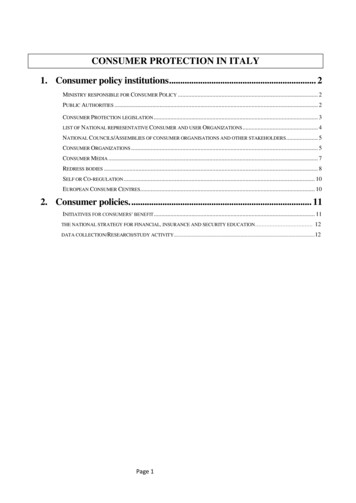
Transcription
CONSUMER PROTECTION IN ITALY1. Consumer policy institutions . 2MINISTRY RESPONSIBLE FOR CONSUMER POLICY . 2PUBLIC AUTHORITIES . 2CONSUMER PROTECTION LEGISLATION . 3LIST OF NATIONAL REPRESENTATIVE CONSUMER AND USER ORGANIZATIONS . 4NATIONAL COUNCILS/ASSEMBLIES OF CONSUMER ORGANISATIONS AND OTHER STAKEHOLDERS . 5CONSUMER ORGANIZATIONS . 5CONSUMER MEDIA . 7REDRESS BODIES . 8SELF OR CO-REGULATION . 10EUROPEAN CONSUMER CENTRES. 102. Consumer policies. . 11INITIATIVES FOR CONSUMERS’ BENEFIT . 11THE NATIONAL STRATEGY FOR FINANCIAL, INSURANCE AND SECURITY EDUCATION 12DATA COLLECTION/RESEARCH/STUDY ACTIVITY.12Page 1
1.Consumer policy institutionsMINISTRY RESPONSIBLE FOR CONSUMER POLICYIn Italy, the Ministry responsible for consumer policy is the Ministry of Economic Development,whose main task is to assure consumer protection in the fields of competition and market. On theother hand, there are some sector-based activities within other Ministries, Public Institutes,Independent Authorities and also there are other institution at the local level with competences inspecific areas. Besides, the necessary link between consumer policy and other policies is currentlyassured through a series of general legal instruments which provide for coordination between thevarious authorities and bodies involved in the different sectors. In this field, it’s necessary to mentionthe State-Regions Conference (Conferenza Stato-Regioni), whose job is to ensure coordination andliaison between the activities of the central government and the regional bodies, and the ServicesConference (Conferenza di Servizi) provided for article 14 of Act n. 241 of 7th August 1990, incases in which there is a need to examine in parallel the different interests that will be affected byan administrative procedure. Moreover, within the framework of its powers, each administrationplays its part in consumer affairs, where necessary.The Italian consumer protection legislation, of European derivation, has been collected into aconsolidated Act called “Consumer Code” (Codice del Consumo - Legislative Decree no. 206, dated6 September 2005), and subsequent amendments and additions, a fundamental reference Lawcovering the protection of consumer and user rights that brings together, coordinates, and simplifiesthe legislation in force on the subject. In conclusion, the Italian consumer protection policy reflectsthe guidelines of the EU programme.PUBLIC AUTHORITIESWith reference to Regulation (UE) 2017/2394 amending Regulation (CE) 2006/2004 oncooperation between National Authorities responsible for the enforcement of consumer protectionlaws (the Regulation on consumer protection cooperation), the Ministry of EconomicDevelopment’s role is both the Italian Single Liaison Office (SLO), i.e. the Public Authoritydesignated as responsible for coordinating the application of the above-mentioned regulation withinthis Member State, and the Competent Authority (CA) with respect to several directives (whichgovern, inter alia, certain aspects of the sale and associated guarantees of consumer goods, ecommerce, timeshare contracts and price dispay of products offered to consumers), that means thePublic Authority established at national level with specific responsibilities to enforce the laws thatprotect consumers' interests.The goal of the aforementioned regulation is to facilitate and strengthen cooperation between publicauthorities responsible for enforcement of the laws that protect consumers' interests in dealing withintra-Community infringements, and to contribute to the smooth functioning of the internal market,the quality and consistency of enforcement of the laws that protect consumers' interests and themonitoring of the protection of consumers' economic interests.Among the Competent Authorities it is worth mentioning: the Italian Competition Authority(AGCM), the Bank of Italy, the Italian Communications Authority (AGCOM), the TransportRegulation Authority (ART), the Italian Regulatory Authority for Energy, Networks andEnvironment (ARERA), the Authority for the Protection of Personal Data, the National Commissionfor Companies and the Stock Exchange (CONSOB), the Institute for Insurance Supervision (IVASS),the Italian Medicines Agency (AIFA), the Italian National Civil Aviation Authority (ENAC), theMinistry of Health, the Ministry of Cultural Heritage and Tourism, the Ministry of EconomicPage 2
Development, the Ministry of Justice.CONSUMER PROTECTION LEGISLATION( Legislative Decree no. 206, dated 6 September 2005, and subsequentamendments and additions – Official Journal 8/10/2005)CONSUMER CODEThe Consumer Code is a fundamental reference law covering the protection of consumer and userrights. The exigency to collect the entire consumer protection legislation into a consolidated act isdue to the necessity to grant this regulation a proper relevance and independency within theframework of the Italian civil code and, at the same time, to set a detailed and organic discipline inrelation to this sector.The Consumer Code consists of 146 articles, divided into 6 parts. This text was also amended: in 2014 by Legislative Decree no. 21, dated 21 February 2014, (implementing Directive2011/83/EU on consumer rights) which introduced more pre-contractual information forconsumers, in particular, with respect to consumer distance and off-premises contracts.In particular, the Directive on Consumer Rights aims at achieving a real business-toconsumer (B2C) internal market, through a right balance between a high level of consumerprotection and the competitiveness of enterprises. in 2015 by Legislative Decree no. 130, dated 6 August 2015, (implementing Directive no.2013/11/EU on alternative dispute resolution for consumer domestic and cross-borderdisputes, in the specific context of the obligations arising from sales contracts, or services,among professionals established and consumers resident in the European Union).Main objectives of Consumer Code: To strengthen consumer and user protection by improving the legal position ofconsumers (both at individual and collective level) through the promotion of awarenessof their rights and interests (education and consumer information) as well as to facilitatethe development of association relations and collective action tools.To simplify contractual relations between professionals and consumers, encouraging theuse of out-of-court schemes for dispute settlement, which principally aim to decrease thenumber of litigations and facilitate a more rapid and effective resolution of disputesbetween citizens- consumers and businesses.To encourage the improvement of the basic rules of business practices used within themarket to the benefit of both consumers and businesses.To coordinate and joint the many existing acts in the field of consumer protection,including the European Union acts. This need also stems from the fact that consumerprotection is a cross-cutting issue that involves a multitude of sectors, such as productsafety and quality and liability for damages caused by defective products, legal guaranteeof conformity and commercial guarantees for consumer goods, tourist services, ecommerce, distance contracts, right of withdrawal, consumer credit, contracts negotiatedaway from business premises and misleading advertising.Page 3
ARTICLES 137 - 140 OF THE CONSUMER CODEThe Ministry of Economic Development keeps a list of the national consumer and user associations.The enrolment in this list is subject to specific requirements, set by Article 137, and submittedaccording to procedures established by the Decree of the Ministry of Economic Development.Currently there are 20 associations enrolled in the list.The Ministry of Economic Development notifies the list and its relative update to the EuropeanCommission, for the purpose of drawing the European union list, held by the European Commission,of the bodies entitled to propose injunctions for consumers’ collective interests.The Article 140 defines that the parties referred to in the Article 139 are qualified to act to protectthe collective interests of consumers and users by applying to a Court for:a) inhibiting actions and behaviors damaging the interests of consumers and users;b) adopting suitable measures to remedy or eliminate the damaging effects of any establishedbreaches;c) ordering to publish measures in one or more national or local daily newspapers, where the publicityof the measures may help to correct or eliminate the effects of any established breaches.ARTICLE 140 A – CLASS ACTIONClass Action is an action to protect the homogeneous individual rights and collective interests ofconsumers and users, exercisable for ascertaining responsibility and for achieving condemnation tocompensation for damages and refunds, arising from damages or contractual defaults, related toconsumption. This action allows consumers or users who have suffered damage deriving fromdefective-dangerous products, or from improper or contrary commercial behavior, in the event thatrecourse to the judge would be too burdensome for a single individual to combine their own forcesthrough collective action to obtain compensation.Through this action, one or more consumers who are holders of homogeneous individual rights, canact on their own or give a mandate to an association for the protection of consumer rights or to acommittee in which they participate. Any interested consumer, holder of a homogeneous claim, canadhere to the collective action already promoted, without having to appoint a lawyer. Each consumerhas the possibility to act individually for the protection of his rights, but in this case he can’t join theclass action.LIST OF NATIONAL REPRESENTATIVE CONSUMER AND USER ORGANIZATIONSThe most representative consumer associations at national level, according to article 137 of theConsumer Code, can apply for registration on the list held at the Ministry of Economic Development.These associations, once registered in the aforementioned list, may appoint an effectiverepresentative and a substitute at the National Council of Consumers and Users (CNCU) establishedin the same Ministry, as required by Article 136 of the Consumer Code.The enrolment in the ministerial list is subject to the possession of a series of mandatoryrequirements provided for by the same article 137, such as for example: to have been established forat least 3 years; to have a statute that provides for the exclusive objective of consumers protectionand a democratic order; to have a minimum number of members reported in a list updated annuallywith the indication of the membership fee paid directly to the association, etc. Registeredassociations (currently 20) each year must produce the appropriate documentation to prove thepossession of these requirements, otherwise they will be removed from the list.The importance of being registered in the ministerial list ex article 137 of the Consumer Code.Page 4
This registration entails a series of prerogatives, such as: the possibility of expressing a representative to the National Council of Consumers and Users(CNCU), advisory body, pursuant to Article 136, paragraph 2, Consumer Code;the possibility of exercising the so called "Inhibitory actions", ex articles 139 and 140 of theConsumer Code, that is, to act to protect the collective interests of consumers and users byrequiring the competent Court to inhibit acts and conduct of companies that are detrimentalto consumer interests;the possibility of benefiting from subsidies and contributions in the field of publishing, exarticle 138 of the Consumer Code;Finally, the possibility of benefitting from grants for initiatives for the advantage ofconsumers, provided for by article 148 of Law no. 388 of 23 December 2000, through the useof the revenues deriving from the administrative sanctions imposed by the Antitrust Authorityand foreseen by the article 11-bis of the Law Decree no. 35 of 14 March 2005, converted byLaw no. 80 of 14 May 2005, as amended by paragraph 142 of article 2 of the law of no. 244of 24 December 2007 - relative to the use of the revenues deriving from the administrativesanctions imposed by the Authority for Electricity and Gas for the financing of projects forthe benefit of consumers of electricity and gas.Although the responsibilities of consumer associations have grown significantly in recent years, theyoperate without the support of specific state funding (except for the expenses of the National Councilof Consumers and Users (CNCU). Even if some Regions provide some financial support, theassociations operate essentially by means of their own resources, deriving from the collection of fundsand the membership fees. These resources are complemented by the financing of projects by nationaland local bodies and by the European OFCONSUMERORGANISATIONSAND OTHERThe National Council of Consumers and Users (CNCU) represents consumer and user associationsnationwide and was founded by Law no. 281 dated 30 July 1998, now article 136 of the LegislativeDecree no. 206, dated 6 September 2005 (Consumer Code). Its competencies, assigned by thelegislator, aim to improve and strengthen consumers’ position within the market. The Council,operating within the Ministry of Economic Development, is chaired by the Minister or by one of hisdelegates. The mandate of CNCU is renewed every three years. At the moment the Council iscomposed of 20 recognized associations, that follow the criteria established by article 137 of theabove-mentioned Legislative Decree, and of a representative member of the Regions andautonomous Provinces, who is elected by the State-Regions Conference.CONSUMER ORGANIZATIONSThe associations recognized by the Ministry are the following (Article 137 of Consumer Code)ACU – Association Consumers and Userswww.associazioneacu.orgADICONSUM – Association of Consumer and Environment Defencewww.adiconsum.itPage 5
ADOC - Association for the Defence and Orientation of Consumerswww.adocnazionale.itADUSBEF – Association of User Protection for Banking, Financial, Postal, and Insurance o.itwww.consumatoridirittimercato.itASSOCIAZIONE UTENTI DEI SERVIZI RADIOTELEVISIVI - Users Association ofBroadcasting sum.itASSOUTENTIwww.assoutenti.itCASA DEL CONSUMATOREhttp://www.casadelconsumatore.itCENTRO TUTELA CONSUMATORI E UTENTI - CTCU(Alto Adige Consumer and User Protection I - CENTRO PER I DIRITTI DEL CITTADINO(Centre for Citizens GA CONSUMATORIwww.legaconsumatori.itMOVIMENTO CONSUMATORIwww.movimentoconsumatori.itMOVIMENTO DIFESA DEL CITTADINOwww.mdc.itPage 6
U.DI.CON – Union for the defense of consumerswww.udicon.orgUNIONE NAZIONALE CONSUMATORIwww.consumatori.itFor further information, see the following website: http://www.tuttoconsumatori.org.CONSUMER MEDIAThe CNCU’s Website www.tuttoconsumatori.org is one of the most detailed websites on addressingconsumer issues. In fact, it provides information on the nature, composition and activities carriedout by the Council and, at the same time, offers the possibility to consult both legislation andprincipal actions in the field of consumer protection.Amongst the most important Websites where it is possible to find useful information concerningconsumer policies it is worth mentioning: . The official Website of the Ministryof Economic Development. ri. The magazine on the activities of the Ministry in the field of market protectionand consumer policies. Its goal is foster the relationship between private and public subjects, toenhance experiences and create greater synergies. The magazine combines consumer rights,proper market functioning and promotion of competition, offering an in-depth study aimed atcitizens and sector operators (national stakeholders, association of consumers, businessorganizations, chambers of commerce, local authorities and universities). http://osservaprezzi.sviluppoeconomico.gov.it/. It provides consumers with important informationon national, regional and sub-regional prices and tariffs of goods and services, realized by theMinistry of Economic Development - General Directorate for Market, Competition, Consumer,Surveillance and Technical Provisions, in collaboration with other State Administrations and thesocial partners.The National Observatory on Prices, attached to the Ministry of Economic Development,supervises prices at national level; for this reason it has identified a basket of goods and services,which reflects the most common items of Italian households expenditure.REDRESS BODIES: COURTS AND ADRSADR: ALTERNATIVE DISPUTE RESOLUTION ON CONSUMPTIONAlternative Dispute Resolution (ADR) is an alternative resolution procedure that aims to offer an outof-court settlement for consumer and business disputes.The act introducing ADR in Italy is Legislative Decree no. 130 implementing the ADR Directive for2013/11/EU.Page 7
The advantages of ADRs are the fast, economical and effective resolutions of consumer conflictsand the streamlining of the judicial burden as they proceed to alternative ways without resorting tothe judge. They also contribute to avoid that consumers, discouraged by the costs and length of thejudicial process, give up the protection of their rights. In this way, consumers and businesses havethe opportunity to resolve both national and cross-border disputes.The ADR body is a public or private body with a permanent structure and is included in a specificlist (provided for in Article 141-decies of the Consumer Code) held by several competent authoritiesdepending on the economic sector in which they operate – Actually the Authorities are the following:Ministry of Economic Development, Ministry of Justice, Bank of Italy, Communications Authority(AGCOM), the Institute for Insurance Supervision (IVASS) and the Italian Regulatory Authority forEnergy, Networks and Environment (ARERA). The Italian Ministry of Economic Developmentcarries out, at the same time, the role of Contact Point among the European Commission and allcompetent authorities that have established a specific list, and the role of competent authorityrealizing and managing its own list. The list of the Ministry of Economic Development is dividedinto two separate sections: ADR Bodies of Joint Negotiations and Bodies of Chambers of Commerce.The first section is dedicated to ADR entities that carry out joint negotiations as referred to in Article141-ter, on the basis of joint conciliation protocols (stipulated between consumer associations andbusinesses). There are currently three bodies involved: the Netcomm Consortium, Trenitalia S.p.A.and Poste Italiane S.P.A.The second section is dedicated to the bodies set up by the Chambers of Commerce (pursuant toArticle 2, paragraph 2 letter g) and paragraph 4 of Law 29 December 1993 no. 580, limited to disputesbetween consumers and professionals; currently nine Chamber of Commerce have been registered.Periodically, ADRs are required to report, as provided for in article 141 – quarter, with the numberof complaints, the time length of the administrative procedure, the reasons of the unsuccessfulconclusion of the disputes and the percentage of the closed cases.ODR - ONLINE DISPUTE RESOLUTIONIn order to settle disputes with businesses for purchases of goods and services online or throughonline markets (so-called Marketplaces), consumers can connect to the Online Dispute Resolution(ODR) Platform, managed by the European Commission, available at the ex.cfm?event main.home.chooseLanguage;onceconnected they can choose the body to contact to resolve the dispute and activate the procedure.BANKING AND FINANCIAL ARBITRATOR (ABF)The Banking and Financial Arbitrator (ABF) represents an alternative dispute resolution systemamong customers, banks and other financial intermediaries relating to purchases of banking andfinancial services or products.It’s a simple, rapid (a few months) and economical instrument compared to judicial proceedings: infact, consumers can choose to use this procedure paying a fee of only 20 Euro, that will be refundedin case of a positive decision by the ABF.The ABF must not be confused with the instrument of conciliation or arbitration. Its decisions are notbinding as those taken by a court judge, but if the intermediary body fails to comply with the abovementioned decisions, the non-compliance is made public.The customer may approach the ABF only after having tried to resolve the problem directly with thebank or the intermediary body by means of a complaint. In case the consumer is not satisfied with theABF’s decision may still apply for the court.The Bank of Italy provides the appropriate means for ABF’s functioning.Page 8
The Interministerial Committee for Credit and Savings (CICR) - belonging to the Ministry ofEconomy and Finance - with the resolution of 29 July 2008, established the criteria for the performanceof these procedures aiming at dispute resolutions and at the same time gave to the Bank of Italy thetask to take care of its organization and its functioning.The Bank of Italy adopted on 18 June 2009 the implementation of the above-mentioned Resolution(published in the Official Journal of 24 June 2009, General Series).The following subjects are obliged to join to the Banking and Financial Arbitrator: Banks; Financial intermediaries - on the lists provided for Articles 106 and 107 of the Banking Code(TUB), including “i confidi” (Article 155, paragraph 4 of the Banking Act) and currencyexchange offices (Article 155, paragraph 5 of the Banking Act); Payment institutions Electronic Money Institutions (IMEL); The Italian Post Office for banking activities (Bancoposta).Banks and intermediaries housed in another EU Member State and operate in Italy under the "freeprovision of services" are not obliged to join the ABF, as long as they adhere or are subjected to aforeign extrajudicial system connected to the Fin-Net network. These organisms are required tocommunicate to the Bank of Italy the out-of-court settlement system to which they adhere or aresubject to in their country of origin.ARBITRATOR FOR FINANCIAL DISPUTES (ADF)The Arbitrator for Financial Disputes (ADF), established by Consob - the Italian Financial MarketsSupervisory Authority, with resolution no. 19602 of 4th May 2016, is a dispute resolution bodybetween retail investors (savers for damage claims up to 500,000) and intermediaries for violatingdiligence, fairness, information and transparency obligations, must be respected by the intermediarieswhen providing investment services.Adhesion to ADF is compulsory for intermediary bodies, and allows the investor to achieve a rapiddecision in relation to the dispute, cost-free and without legal assistance.ACF ensures impartiality and independence of judgment. If the investor is not satisfied with thedecision may still apply to the appropriate administrative or judicial authority. Applying to ADF orother alternative dispute resolution system is a condition of admissibility to start a judicial procedure.ADF is composed of the Statutory Board and the Technical Secretariat. According to article 5,paragraphs 1 and 4 of the aforementioned Regulation, the Statutory Board of ADF is composed of aPresident and four members, three of which - including the President - are selected by the Consob,two designated by the CNCU and two by the category associations of the most representativeintermediaries at national level. In the same manner, one or more alternate members are appointedfor each effective member.SELF OR CO-REGULATIONThe Consumer Code contains references to Self-regulation. In particular, article 27 refers to the fieldof advertising (see also article 27-a and article 27-quater) and article 101 to the field of publicservices.Self-regulation is also mentioned in the article 18 of Legislative Decree n.70/2003, (e- commerce)and in the article 18 of the Legislative Decree n.190/2005, (concerning the distance marketing ofconsumer financial services) transposed in Consumer Code in article 67- a.Page 9
In the advertising sector, a self-regulatory system was set up in Italy in 1963, the year in which the7th National Conference on Advertising approved a motion which set principles and aims of this selfregulation.The Self-Regulatory Institute of Advertising, is the main example of self-regulatory body in Italy,based on a Code of Self-Regulation whose rules as a whole mark the boundaries of what is deemedto be a correct and lawful communication.EUROPEAN CONSUMER CENTRESThe Italian European Consumer Centre (https://www.ecc-netitalia.it/en) is financed by the EuropeanCommission, the Italian Ministry of Economic Development, the Autonomous Province of Bolzen South Tyrol and by the Autonomous Region of Trentino - Alto Adige/Südtirol.It is supported by the Verbraucherzentrale Südtirol (Consumer Protection Centre) and Adiconsum.The task of the European Consumer Centres (ECC) is to offer support in every Member State toconsumers on cross-border issues; each ECC takes also part to the European Consumer CentreNetwork (Ecc-Net).Page 10
2.Consumer policiesINITIATIVES FOR CONSUMERS’ BENEFITArticle 148 of the law of 23 December 2000, no. 388, provides, in paragraph 1, that "the revenuesderiving from the administrative sanctions imposed by the Antitrust Authority are destined toinitiatives for the benefit of consumers".The use of the Fund is provided by the Allocation Decree adopted by the Ministry of EconomicDevelopment, subject to the opinion of the competent parliamentary Commissions.The standard was applied for the first time at the end of the year 2002.The allocation of the funds can be summarized in the following types of guidelines: specific initiatives identified and managed from time to time by the Ministry in collaborationwith implementing bodies (for example some financial contributions to consumerassociations assisting consumers free of charge in the successful conclusion of jointconciliations, etc.) information services for consumers and protection of rights directly managed by the Ministry(for example by “the Italian Price and Tariffs Monitoring Body”, or by “the Italian Price andFuel Monitoring Body”, etc.) or through agreements with other bodies (for example“TuoPreventivatore”, the online service for price comparison, or through education toinsurance policies, through an anti-fraud information archive, or by means of genericcommunication campaigns – it could be cited for example "competition and its benefits", aradio and TV commercial realized in collaboration with the Antitrust Authority in 2018, etc.) initiatives carried out by the Regions in collaboration with regional consumer associations(funding of regional programmes through calls for tenders) initiatives carried out by consumer associations, registered in the list referred to in theConsumer Code (financing of projects proposed by the AACC selected through calls fortenders) support to this General - Directorate (DG Market, Competition, Consumer, Surveillance andTechnical Provisions), of the Ministry, aiming at implementing consumer protection, marketsurveillance and product safety functions, both at European and national level (for exampleby means of agreements with public or in-house parties to support the Ministry in the abovementioned sectors). In the specific case of product safety, for example, through agreementswith the Chamber of Commerce system (through their Union) we carry out annualsurveillance programmes on product conformity, security and energy efficiency.Resources managed by the Regions, allocated in proportion to population, are targeted to projectsthat take into account local needs, and which are run by local actors involved in consumerprotection.Finally, the Ministry of Economic Development uses directly some resources, also throughagreements with various government agencies, to realize some of the most important projects.Among the numerous projects realized or still in progress it is worth mentioning in particularthose aiming to combat counterfeiting, to monit
CONSUMER PROTECTION LEGISLATION CONSUMER CODE ( Legislative Decree no. 206, dated 6 September 2005, and subsequent amendments and additions - Official Journal 8/10/2005) The Consumer Code is a fundamental reference law covering the protection of consumer and user rights. The exigency to collect the entire consumer protection legislation into .


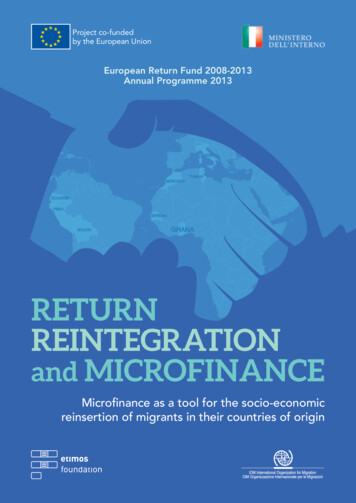
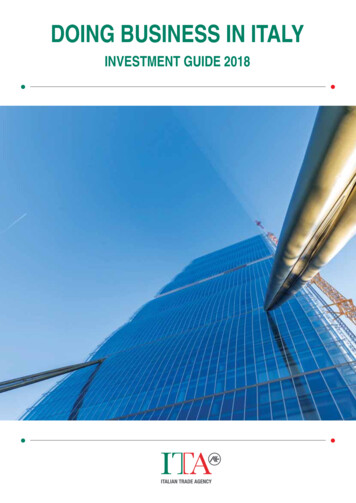

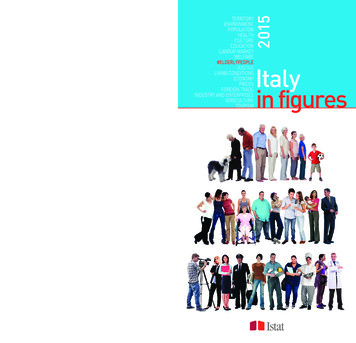
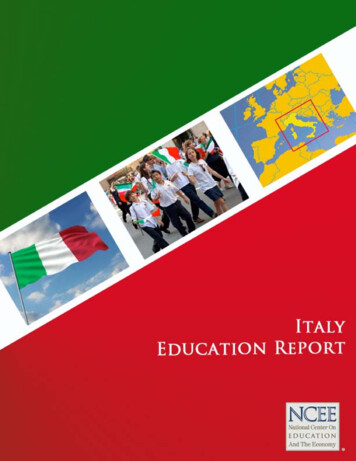
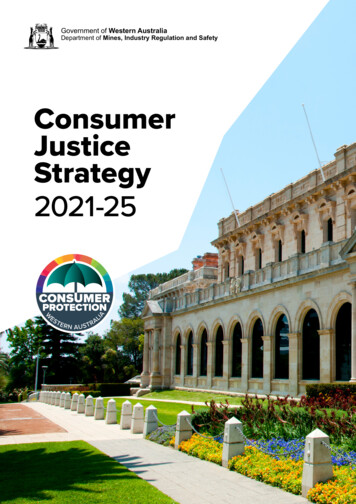
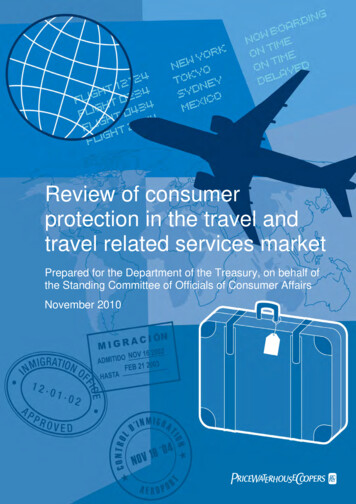
![Chapter 11. Consumer Protection. [Note] - Montgomery County, Maryland](/img/40/chap11.jpg)
